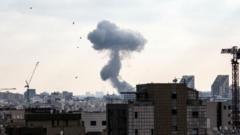In the wake of U.S. airstrikes on Iranian nuclear sites, Gulf countries call for de-escalation as fears of Iranian retaliation loom. The strikes are perceived as a critical shift in U.S.-Iran relations, with potential implications for regional stability and an emphasis on diplomatic efforts.
U.S. Strikes on Iranian Nuclear Sites Spark Regional Tensions and Calls for Restraint

U.S. Strikes on Iranian Nuclear Sites Spark Regional Tensions and Calls for Restraint
The recent U.S. military strikes targeting Iran's nuclear facilities have escalated regional anxieties as echoed by Gulf nations, amid fears of retaliatory actions from Tehran.
---
June 22, 2025 — As the U.S. military conducts airstrikes on key Iranian nuclear sites, the region is experiencing heightened tensions and cautious responses from Gulf nations concerned about potential retaliation from Tehran. Diplomatic communications reflect a mix of alarm and a desire for restraint.
The Pentagon's strikes, which reportedly caused severe damage to three nuclear facilities, were greeted with a collective expression of concern from countries that host U.S. military forces. Saudi Arabia's foreign ministry, while sidestepping direct blame, called for de-escalation and restraint, indicating a wariness of the military operation's broader ramifications. Qatar's response notably lacked a condemnation of the U.S., instead urging all parties to act with wisdom.
These reactions underscore the precarious position of Gulf nations, heavily dependent on U.S. military support yet anxious about becoming potential targets for Iranian reprisals. The Islamic Revolutionary Guards Corps of Iran hinted at vulnerabilities in U.S. positions in the region, warning that American bases could face retaliation.
Bahrain, housing a significant U.S. military presence, went so far as to advise civil servants to work from home, reflecting the seriousness of perceived threats. The overarching sentiment among Gulf states is one of cautious concern; while they value U.S. strategic partnership, the risk of regional conflict has prompted calls for diplomacy and measured responses.
In Iran, civilians have voiced fear and anger in light of the airstrikes. Reports indicate that the U.S. strikes on nuclear facilities have galvanized some domestic support for heightened defenses against perceived external aggression. Yet, it remains to be seen how the Iranian leadership will respond, balancing the need for a show of strength with the risks of escalating violence that could further destabilize the region.
International actors, including European allies, echoed the calls for restraint, as the fallout from the strikes continues to influence diplomatic negotiations on nuclear oversight in Iran. The situation remains fluid, and the potential for escalatory responses raises the stakes in an already volatile landscape. As both Iran and the Gulf states navigate this tumultuous period, the prospect for renewed conflict or a push for diplomacy hangs in the balance.
June 22, 2025 — As the U.S. military conducts airstrikes on key Iranian nuclear sites, the region is experiencing heightened tensions and cautious responses from Gulf nations concerned about potential retaliation from Tehran. Diplomatic communications reflect a mix of alarm and a desire for restraint.
The Pentagon's strikes, which reportedly caused severe damage to three nuclear facilities, were greeted with a collective expression of concern from countries that host U.S. military forces. Saudi Arabia's foreign ministry, while sidestepping direct blame, called for de-escalation and restraint, indicating a wariness of the military operation's broader ramifications. Qatar's response notably lacked a condemnation of the U.S., instead urging all parties to act with wisdom.
These reactions underscore the precarious position of Gulf nations, heavily dependent on U.S. military support yet anxious about becoming potential targets for Iranian reprisals. The Islamic Revolutionary Guards Corps of Iran hinted at vulnerabilities in U.S. positions in the region, warning that American bases could face retaliation.
Bahrain, housing a significant U.S. military presence, went so far as to advise civil servants to work from home, reflecting the seriousness of perceived threats. The overarching sentiment among Gulf states is one of cautious concern; while they value U.S. strategic partnership, the risk of regional conflict has prompted calls for diplomacy and measured responses.
In Iran, civilians have voiced fear and anger in light of the airstrikes. Reports indicate that the U.S. strikes on nuclear facilities have galvanized some domestic support for heightened defenses against perceived external aggression. Yet, it remains to be seen how the Iranian leadership will respond, balancing the need for a show of strength with the risks of escalating violence that could further destabilize the region.
International actors, including European allies, echoed the calls for restraint, as the fallout from the strikes continues to influence diplomatic negotiations on nuclear oversight in Iran. The situation remains fluid, and the potential for escalatory responses raises the stakes in an already volatile landscape. As both Iran and the Gulf states navigate this tumultuous period, the prospect for renewed conflict or a push for diplomacy hangs in the balance.























